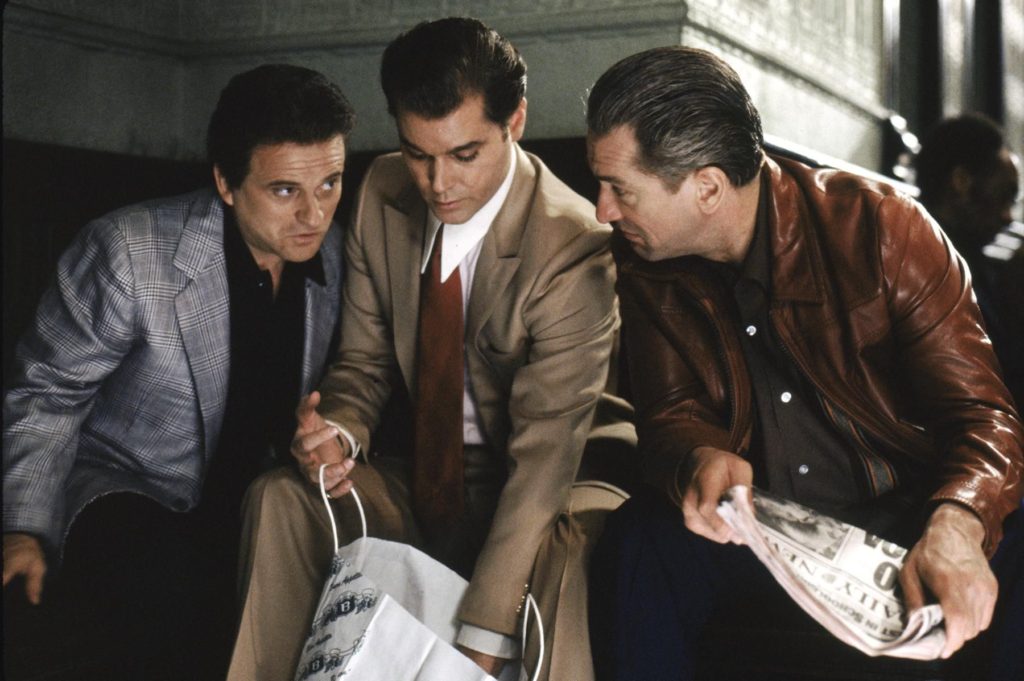Goodfellas Review

This review comes from June 2, 2009. It was not my first rodeo with Scorsese, but coming back to this film 10 years later, I have to say I’m off base in disregarding Scorsese’s direction. Storytelling structure is definitely the film’s hallmark, but the camera has a lot to do with how that story gets told.
While the title of mob masterpiece most often goes to “The Godfather” for its stunning drama and dark beauty, something must be said for honesty. Those two points belong to Martin Scorsese’s “Goodfellas,” which plays up the highs and lows of gangster life in cold truth, without any jazzed-up one-liners or thematic scores, with only honest-to-goodness storytelling and direction.
Some crime films rely on characters killing or torturing people in crazy and memorable ways, but in “Goodfellas,” when the only nutty character, Tommy DeVito (Joe Pesci), blows his fuse a few times, it feels jarring and unnatural, not cool or awing in any way. It’s because to Scorsese, these people are real, this is their life, and a hit is a hit because that’s how they do things — there’s not a production to be made out of it.
The film, based on true events with much consultation from the real life people who were being portrayed in the film, focuses on gangster Henry Hill (Ray Liotta) and how the mob raised him and gave him everything he had, brought him the highest of highs and took him pretty low — might have even killed him had he not entered the Witness Protection Program in the ’80s.
Scorsese isn’t brilliant in this film. It’s not visionary. Leave that for some of his other films — this is just incredibly good storytelling. “As far back as I can remember, I always wanted to be a gangster” is not a memorable line that pulls you in at the film’s beginning because it was inspired writing — it’s Scorsese understanding how to take a script and bring it to life in the best way possible. The only truly artistic work being done is some of the camera shots and compelling angles. He finds the script’s best moments and adds something to them. Otherwise, he is telling this story, he is making a cinematic homage to this incredible true story as penned by Nicholas Pileggi.
Of course it helps that the actors he had to work with were top notch. Following him from “Raging Bull” among other films were Robert DeNiro and Pesci as Jimmy and Tommy. Both characters are easily provoked, sometimes irrational men with big mouths their hearts in the right place despite actions to the contrary. Pesci is particularly memorable between the “in what way am I funny?” and “deer paw” scenes, a deserved Oscar for great character work. As for Liotta, his great strength is swaying our opinion of him back and forth with his various infidelities yet natural charms — it’s a role that had Scorsese cast 15 years later would have gone to the likes of Leonardo DiCaprio, so let that stand as some acclaim for Liotta. It is also this dichotomy of warm support and foul-mouthed matter-of-factness that makes us feel conflicted as we watch the entire film. It doesn’t elicit pity for the mafia, but it certainly complicates the “wiseguy” stereotype, which I think is much of Scorsese’s goal.
“Goodfellas” only lacks in an emotional or cathartic pull. Many times you wonder why this story is being told, but then you realize how incredibly well it’s told and you acknowledge that it’s some of the finest film-making out there, regardless how it makes you feel.
4.5/5 Stars
Goodfellas
Directed by Martin Scorsese
Written by Martin Scorsese, Nicholas Pileggi (book)
Starring: Ray Liotta, Robert DeNiro, Joe Pesci, Lorraine Bracco, Paul Sorvino




0 Comments
You can be the first one to leave a comment.